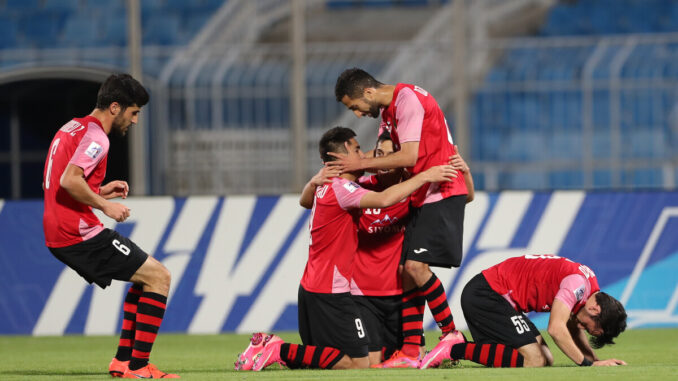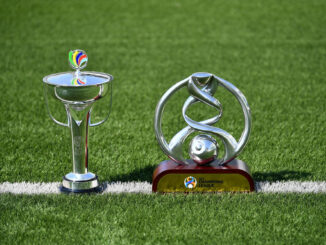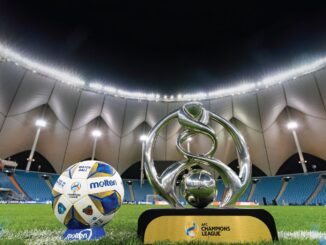
The forthcoming AFC Champions League season is set to kick off this Thursday in Saudi Arabia, as the West region of the continental club championship returns for 2022.
Amongst the participants, Central Asia’s presence swells to four clubs for the first time since 2016, following a meagre few years which bottomed out at only one participant in 2020.
While in 2016, Uzbekistan were the sole nation represented, the sustained growth in the region’s game, coupled with the AFC’s promotion of leagues on the fringes of the tournament, sees Tajikistan, and for the first time in 20 years, Turkmenistan enter the group phase proper.
Turkmenistan returns to the Champions League
The return of Turkmen football to Asia’s premier club competition is a long overdue one. The nation has regularly competed in the latter stages of the AFC Cup, with current Yokary Liga champions Altyn Asyr having featured in the 2018 final.
With the rising standard being reflected with the national team, who qualified for the last Asian Cup and, but for North Korea’s withdrawal could have made it to the latter stages of World Cup qualification, representation at this level marks another significant step forward for Turkmen football.
It also offers an opportunity to draw back the curtain on what remains a broadly secretive football scene. Following some minor notoriety in continuing their domestic league through COVID in 2020, information on how football is being run out of Ashgabat remains sparce.
In the increasingly brief statements that are released via their federation’s online communication channels, and through state television addresses, the picture growingly becomes even more murky.
Reigning champions Altyn Asyr clinched their eighth title in eight years, a growing dynasty that was only formed over the last decade since the team was set up under the moniker of the telecommunications company that bears the same name.
Concerns over match integrity and federation interference have been widespread, but the quality on the pitch has made great strides in the last few years.
From Altyn Aysr’s AFC Cup final appearance, through their ultimately doomed Asian Cup group stage exit in 2019; the TFF attempted to reform and improve its game through cooperation with the Croatian Football Federation, with the appointment of Ante Mise as head coach in 2019.
While the pandemic put pay to his time with the national team, the league itself continues to benefit from a broader sharing of domestic talent.
For much of the last decade, the national team has mirrored Altyn Asyr’s rise and fall, as the personnel, from the playing staff down to the coach, legendary Yazguly Hojageldyyev were a mere reflection of one another.
Since Mise’s brief time in charge of the national team, talent has been able to move freer between the top clubs in Turkmenistan, and out to their regional neighbours, particularly Uzbekistan and Kyrgyzstan.
Through this we’ve seen the improvement in fellow capital club Ahal, the side returning the Turkmen flame back to the Champions League this season after two decades away.
With Altyn Asyr failing to acquire the relevant licence to participate; eternal runners up Ahal (finishing second in each of the last five seasons) will instead take the automatic group stage birth.
The club, who cut down their deficit on top spot to five points last term (from 18 the previous year). had a productive 2021, beating Kyrgyzstan’s Dordoi and Tajikistan’s Ravshan Kulob in continental play to participate in the AFC Cup zonal finals.
Their ultimate exit, to the eventual runners up, Uzbek Super League side Nasaf, away in Qarshi was an admirable one; losing only narrowly 3-2, demonstrating the vast improvements made over recent years.
While dispensing with their coach nearly every given year, the club does have a significantly prominent style that sets them apart from their national rivals; a more possession-based, methodical approach, that has picked up admirers.
New manager Rowsen Muhadov returns to the club for a second time, having temporarily become part of the national team setup over the last year. He’s able to call upon national team captain Arslanmyrat Amandov and striker Didar Durdyev who have both just returned from spells in Uzbekistan.
They add to a squad that features Turkmen player of the year Elman Tagayev, who scored five goals in three AFC Cup matches last season and national team regulars Sohrat Soyunov and Abdy Bashimov.
Their prospects, from a group featuring Foolad of Iran, Shabab Al-Ahli from UAE, and Al-Gharafa of Qatar are slim, but they’ll be taking confidence from another debutant that rocked the continent last year, in making it out of the group phase at the first time of asking.
Istiklol return, for a difficult second album
The pinnacle of last year’s pandemic disrupted Champions League season was the impact of Tajik super club Istiklol. Their triumph, to top a group that featured eventual champions Al-Hilal and 2015 runners up Shabab Al-Ahli, was widely heralded for the sort of jolt to the system that the continent’s game had been needing for years.
Flying the flag for the AFC’s newly expanded competition, Istiklol, alongside the likes of Hong Kong’s Kitchee and India’s FC Goa, underlined the importance of representation at the highest level of the game to a country’s footballing development.
Their crushing 4-1 victory over Al-Hilal in Riyadh firmly put Tajik football in the shop window, and by God did the punters come flocking.
As we enter a new season of both Tajik domestic football, which kicked off last weekend, and continental play with this week’s Champions League return, Istiklol’s squad materialises a pale comparison to that which performed so magnificently in Asia one year ago.
No fewer than ten first team squad members have subsequently moved on; the young duo of Vahdat Hanonov and Manuchehr Safarov have moved to Iranian giants Persepolis, creative playmaker Alisher Dzhalilov moved to Uzbekistan with AGMK, while their Ukrainian centre back partnership of Oleksiy Larin and Andriy Mischenko both joined him in the Uzbek capital with Pakhtakor and also AGMK respectively.
A squad with such verve and synergy, it must be said have been predictably capitalised upon by those around them, which undoubtedly will have significant positive impacts on Tajik football in the long term.
In the short-term, however, they leave behind a team in considerable transition; aiming to not only back up their impressive showing on the continental stage but retain their domestic title for a ninth time in succession.
There remain some familiar faces in the squad, however; namely striker Manuchekhr Dzhalilov, who clinched the domestic golden boot last term, Mukhammadzhon Rakhimov, who opted to return from a nine month stint in Kazakhstan early this year, national team defender Akhtam Nazarov, alongside new European defensive signings Russian Nikita Chicherin and Georgian born Ukrainian Temur Partsvania.
Vitaliy Levchenko, their Tajik-born Ukrainian coach, who has overseen Istiklol’s growth from domestic big fish to continental disrupter over the last two years, has his work cut out to pull another rabbit out the hat this term.
The club’s hopes of progressing through a group of Sharjah, Al-Rayyan and a familiar foe in Al-Hilal, in Riyadh once more, look remote, but you can’t say they haven’t got form in this area to upset the odds.
Uzbek football looks to bounce back
With progress being made across the Central Asian region, usual juggernauts Uzbekistan have been decidedly quiet in recent times.
Alongside the national team’s failure to make it to the final stages of World Cup qualification for the first time in their history last year, their club sides failed to progress past the group stages of the Champions League for the fourth time in five seasons.
Uzbekistan’s performance in Asia has long been scrutinised, and with the AFC’s expansion of the Champions League in the last two years, their regression has started to hit home.
In the last seven campaigns, only two of the 17 Uzbek teams who participated in the Champions League group stages have progressed to the knockout stages; with no team being able to match their best showing back in 2008 and 2012 by the then big spending Bunyodkor in making the semi-finals.
Their most recent success, through fellow Tashkent giants Pakhtakor, as the sole Uzbek Super League representative in 2020, made it through to the quarter finals.
Back then, the Shota Arveladze inspired Pakhtakor, in retrospect a golden generation of Uzbek domestic football, were unlucky not to progress further; fast forward to 2022 and hopes have shrunk back substantially.
The new season, that kicked off early last month promised hope that Uzbek domestic football may be about to change. The last few years have become a slow building monopoly of Pakhtakor’s making; but while their grip on the title tightens, the quality of football has retreated.
Ahead of this season, new hope through a revitalised and well-resourced rival, in the form of Navbahor Namangan promised a true challenger to Pakhtakor’s crown. While there has been snippets of positive attacking football (namely through this season’s surprise package Qizilqum), the reversion to type remains too strong, as was on full display with crowd trouble marring last week’s top of the table clash in Tashkent.
Pakhtakor, despite being depleted of the qualities they may have wielded two seasons ago, remain Uzbekistan’s premier club. Their approach, far from the attack focussed, demolition machine that grew in prominence under Arveladze, now resembles a calculated pragmatic approach, that slowly lurches towards a fourth successive title.
Early days in the season have seen them accrue only five goals in their first four matches, with Serbian focal point Dragan Ceran bailing them out in the majority of cases. This effective, but potentially one-dimensional route of play threatens to struggle making headway as we approach the new continental season.
The new faces of Oleksiy Larin and Kamen Hadzhiev offer further stability defensively, but there is little support for Ceran in attack following the departures of Igor Sergeev and Eren Derdiyok over the last two years; unless former Blackpool player Oliver Sarkic can build upon his impressive, if admittedly brief cameo last week.
Pakhtakor have drawn a favourable enough group in Iran’s Sepahan, Saudi club Al-Taawoun and Qatar’s Al-Duhail. It represents a group of nearly men over the last couple of seasons, out to prove a point, it’s to be seen if Pakhtakor can raise their level to be that very team.
Joining Pakhtakor this term from Uzbekistan is last season’s AFC Cup runners up Nasaf Qarshi, following their 2-0 away win over Emirati club Baniyas in the preliminaries.
For the first time in a decade, Uzbekistan were granted path into the AFC Cup last season following early elimination in the Champions League preliminaries; with Nasaf going on to illustrate the considerable gap that still remains between the two top tier continental competitions.
Nasaf are a more progressive, forward-thinking team, led by the vastly experienced and well thought of Ruziqul Berdiev.
What they lack in investment, they make up for in young quality footballers; demonstrated by last year’s AFC Cup golden boot winner Khysayin Norchaev, playmaker Oybek Bozorov and the growingly impressive defender Husniddin Aliqulov.
While their outlook is more appealing on the eye, their standard remains a clear distance behind Pakhtakor, and ultimately the elite levels of Asia.
Their group stage draw is lop-sided in its weighting with Qatari champions Al-Sadd topping the bill alongside Saudi’s Al-Faisaly and Jordan’s Al-Wehdat, who struggled on debut last year.
While expansion of this tournament has brought more exposure to Central Asia, the next stage is to prove their worth on the pitch on a regular basis.
With Istiklol’s success last year, the region was catapulted into continental focus. With expectations rising, a mix of new faces and familiar weary competitors lead the line for fans to pin their slim hopes on.
With an up-hill climb to contend with, many will be hoping there’s one shining light to emerge from the pack, to extend Central Asia’s participation past a relatively brief month-long cameo.
Photo: Asian Football Confederation




